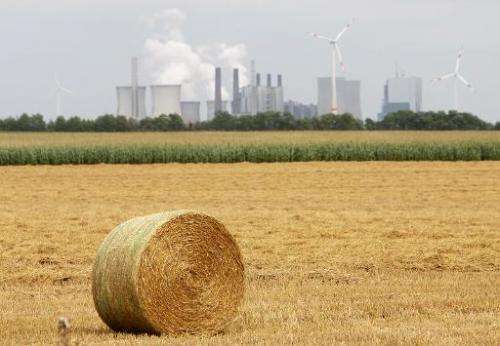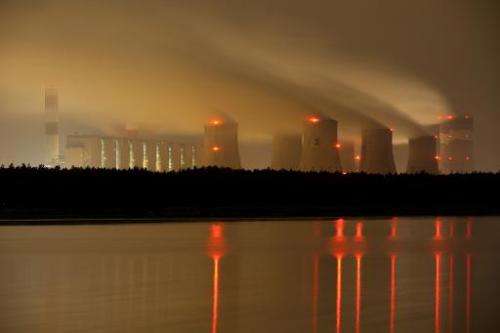The Frimmersdorf power station on August 10, 2010 in Grevenbroich, western Germany
After months of tough negotiations, the European Commission recommended Wednesday a new energy savings target of 30 percent so as to combat climate change and ensure self-sufficiency.
In January, the Commission, the European Union's executive arm, said the 28-nation bloc should cut its greenhouse gas emissions by 40 percent by 2030 while renewables should account for 27 percent of energy use.
It decided not to set an efficiency target because of sharp differences between member states, especially as steady energy prices in recent years had reduced the incentive to make costly investments in new technology.
But Russian threats to halt gas supplies to Kiev over the Ukraine crisis, potentially threatening EU supplies ahead of peak demand in the coming winter months, have changed thinking.
EU Energy Commissioner Guenther Oettinger stressed both aspects as he announced the 30 percent target on Wednesday.
"Our proposal is the basis to drive the EU towards increased security of supply, innovation and sustainability, all in an affordable way," Oettinger said.
"Our aim is to give the right signal to the market and encourage further investments in energy saving technologies to the benefit of businesses, consumers and the environment."
The proposed 2030 targets would build on the current programme, which aims to cut greenhouse gas emissions by 20 percent compared with 1990 levels by 2020, with renewables and savings also set at 20 percent.
Oettinger said the 30 percent goal delivers more than the 25 percent level, sought by some states, which would have been compatible with the 40 percent greenhouse gas reduction target for 2030.
The Belchatow power plant on September 28, 2011 in Belchatow, near Lodz in central Poland
Setting the level higher will give industry and business the incentive to do more, creating much needed jobs and putting Europe in the "vanguard" of alternative energy development.
Environmentalists disappointed
Environmentalists wanted the Commission to go much further, arguing that only more substantial cuts would be enough to make a real difference to global warming and energy self-sufficiency.
Greenpeace, which wanted the three targets set at 55, 45 and 40 percent, denounced Oettinger for proposing "another gutless plan" which will only satisfy the huge energy companies and vested interests.
Ambitious targets "would drastically cut the need for expensive imports of fossil fuels from Russia and elsewhere," it said in a statement.
The Commission's own research "shows efficiency could also create three-and-a-half million jobs, while helping tackle climate change," it said, adding: "It's a no-brainer."
The Commission's proposals will go to an October summit of European Union leaders needing approval by all 28.
Discussions are likely to prove difficult, both over the specific targets and whether they should be equally binding on all member states or represent overall EU goals.
"It is going to be a tough battle," one EU source said.
Some countries, especially newer member states such as Poland, which relies heavily on coal, and Slovakia and the Baltic countries which rely heavily on Russian gas, are cautious given the high cost of investment in new resources and technology.
Others, such as Britain which has put nuclear power at the heart of its strategy, want to be left alone to decide their own energy mix.
In marked contrast, Germany is abandoning nuclear energy in favour of renewables.
The European Environment Agency reported last month that by end-2012, the bloc had cut greenhouse gas emissions by 19 percent compared with 1990 while economic output had increased 45 percent in the same period.
The United Nations has backed a new global treaty on climate change to be agreed at talks in Paris late next year as its forecasts show global warming proceeding apace.
© 2014 AFP

























